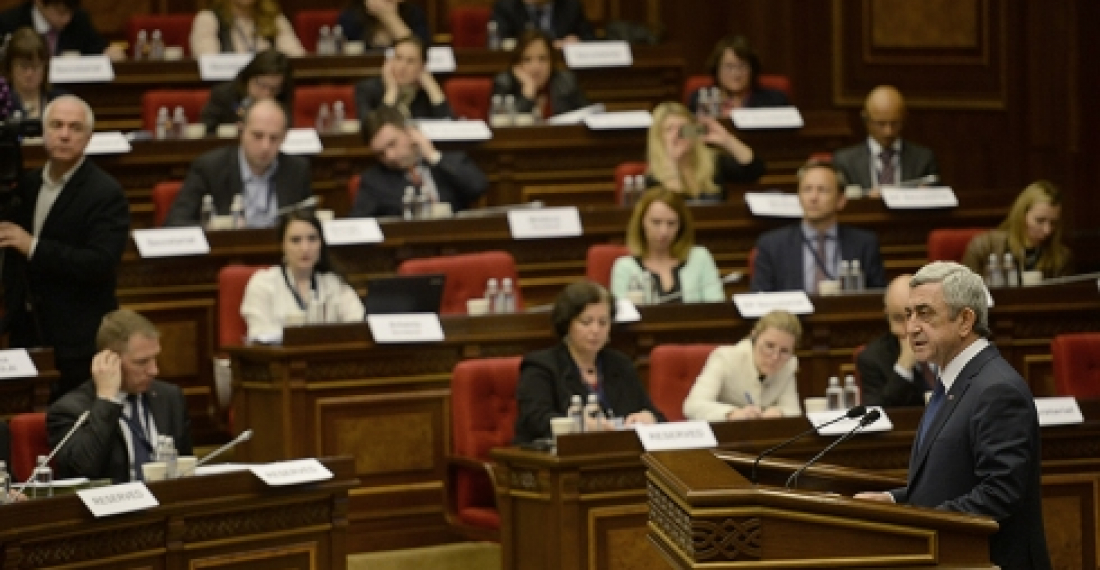Yerevan and Baku exchange rebukes on current lack of progress in peace process.
The president of Armenia, Serzh Sargsyan, on Tuesday (17 March) addressed the 4th Plenary Session of the Euronest Parliamentary Assembly which was held in Yerevan. Euronest is a parliamentary framework bringing together the European Parliament and the Parliaments of the six Eastern Partnership countries. During his speech the Armenian leader addressed the Karabakh issue and criticised Azerbaijan for obstructing the work of the Minsk Process. Responding to the Armenian President the day after a spokesperson for the Azerbaijani Foreign Ministry dismissed the criticism and urged Armenia to avoid further delaying starting negotiations on a comprehensive peace agreement.
In his speech to the Euronest Parliamentarians, President Sargsyan said:
"......Our neighboring State demonstrates unconstructive and maximalist stance in the very process of the peaceful resolution of the Karabakh conflict by backtracking on the already agreed points, by consistently trying to change the format of the OSCE Minsk Group Co-Chairmanship or to launch negotiations on the great treaty without registering agreement on the basic principles. It should be obvious that the keys to the settlement of this issue are not located in Paris, Moscow or Washington, but in Baku, Stepanakert and Yerevan. Meanwhile, Azerbaijan invents far-fetched excuses in order to avoid the settlement based on the principles proposed by the Co-Chairs.
I think such tactics of that country deserves unequivocal assessment of the international community and European institutions.
Regardless of Azerbaijan's unrealistic claims and periodic provocations carried out on the Line-of-Contact there is no alternative to the peaceful resolution of the Nagorno Karabakh conflict. It has been the position of international community, especially in the recent years, that there is no alternative to the comprehensive settlement of this conflict but by the exercise of the people's right to free expression of their will and self-determination, which is grounded in the European and universal values. This conflict can be comprehensively settled through the free exercise of this right by the people of Nagorno-Karabakh. That is the approach upon which the proposal of the OSCE Minsk Group Co-Chairs is built."
You can read the full text of the speech of the Armenian President here.
Azerbaijani response
Responding to the speech of the Armenian leader the spokesperson of the Azerbaijani Foreign Ministry, Hikmet Hadjiev, was quoted by the Azerbaijani News Agency APA as saying that "We would like to remind the leadership of Armenia, which states that there is no any alternative to self-determination of peoples, based on European and world values that these values, which it says, without going into their essence, does not provide for the bloody ethnic cleansing, occupation and aggression".
Hajiyev noted that after the withdrawal of Armenian armed forces from the occupied territories of Azerbaijan, Armenian and Azerbaijani communities of Nagorno-Karabakh region of Azerbaijan can determine their own destiny within the borders of Azerbaijan, a position which is also supported by the OSCE Minsk Group: "The only way to a comprehensive settlement of the conflict is only this. To suggest any other solution for this conflict is dream and far from objective reality."
According to the Azerbaijani official it would be better if Armenian leadership, which speaks about "peace" and interprets the OSCE MG activity in its own way, clarifies why Armenia whilst insisting on supporting the work of the Minsk Group, evades from starting work on the development of a comprehensive peace agreement.
"The Armenian side, finally, has to reckon with the reality that the representation of the status quo, resulting from the occupation and aggression as the solution of the conflict based on the principle of "fait accompli", can never be accepted by the international community", APA quoted Hadjiev as saying.
source: commonspace.eu with the Press Service of the president of Armenia and APA news agency, Baku.
photo: President Serzh Sargsyan of Armenia addressing the 4th Plenary Session of the Euronest Parliamentary Assembly in Yerevan on Tuesday, 17 March 2015. (picture courtesy of the press service of the President of Armenia).







